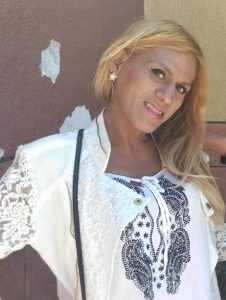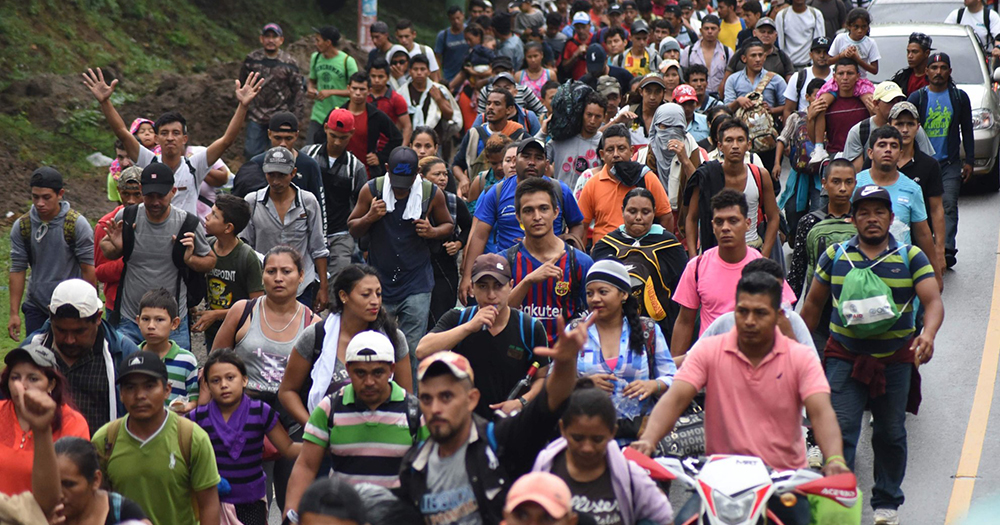It wasn’t the first caravan of desperate Central American refugees that made its way to the US border, but the late 2018 march was the first with a visible LGBT+ presence. Facing discrimination from their fellow migrants, some 80 LGBT+ people banded together for support and protection. Soon after they were the first to reach the crossing in Tijuana, Mexico seven couples from among them held a group wedding. Many were from Honduras where violence and impunity are endemic for large swathes of the population.
Homophobia aggravates the levels of violence, as two 2017 reports, one by Amnesty International and the other by Human Rights Watch, make clear. “In a couple of years in the neighborhood I lived in, four transgender people and three gay men were murdered,” explains Jose Cortes. “I knew I had to get out.”
In a country of just over nine million people, more than 300 LGBT+ people have died violently over the past decade, according to the lesbian network CATTRACHAS. Half of them were gay men and almost a third were transgender people. “Fear of reprisals mean that is likely that many more cases go unreported,” adds CATTRACHAS coordinator, Indyra Mendoza.
The murders in Latin America’s second poorest country skyrocketed after 2009, when democratically-elected President Manuel Zelaya was ousted during a constitutional crisis. From an average of two murders a year prior to 2009, the rate spiked to 31, according to CATTRACHAS research. This has made Honduras one of the seven most dangerous countries in the world to be LGBT+.
A child under the age of 18 dies from violence every day in Honduras. For a country not engaged in active warfare, this figure is staggering. #ENDviolence https://t.co/QwAcUxxnyx
— Catherine Russell (@unicefchief) April 3, 2019
Since Zelaya’s expulsion, LGBT+ organisations have played a critical role in the effort to restore democracy. CATTRACHAS and some 13 other LGBT+ rights organizations have repeatedly marched to demand fair elections and citizen participation in drawing up a new constitution. This visibility has turned LGBT+ activists into targets of repression prompting the United Nations to pressure the Honduran government to protect LGBT+ rights activists from persistent surveillance, harassment, arbitrary detentions, assaults, robberies, theft, threats and sexual assault.
René Martínez Izaguirre was one of them. President of the Comunidad Gay de San Pedro Sula (Gay Community of San Pedro Sula), René worked for many years as an advocate for sexual minorities and human rights more generally at the Centros de Alcance in what is one of the world’s most dangerous cities. He was murdered in June 2016 at the age of 40.
The hatred that Honduran LGBT+ people face often begins at home. Almost all asylum seekers and refugees to the US from Honduras are survivors of sexual and gender-based assault. “My father is amachista (male chauvinist) and abused me because I’m gay,” says Jose Cortes. “When I was 13, I went to live with my aunt, but she was a single mother with four children, and so I left to live on my own when I was 16. It wasn’t safe for me there anyway because her sons had become involved with gangs.”
Gang warfare is a major contributor to Honduras’ dubious distinction as having one of the world’s highest murder rates. Most gang members are young men under 16 with lives profoundly scarred by violence. Once they are forced or see no alternative but to join a gang, their only way out is death. This subculture is ruled by a highly sexist code of conduct, and as extortion and blackmail are the gangs’ bread and butter, they often see LGBT+ people as easy targets.
But gangs aren’t the biggest problem. “The police constitute the primary perpetrator of violations of the rights of the LGBT+ community,” the Coalition Against Impunity, an alliance of 29 Honduran NGOs, reported to the Index on Censorship, denouncing a “police policy of frequent threats, arbitrary arrests, harassment, sexual abuse, discrimination, torture and cruel or degrading treatment”. The police routinely extort money from trans women who engage in sex work.
The brutality and impunity carry into the courts as well. 95 percent of the crimes against LGBT+ people go unpunished according to the Honduran state’s human rights agency. Of 225 violent deaths between 2008 to 2015 reported by Cattrachas, only 13 resulted in a conviction.
The combined effect of this rampant violence is to fuel LGBT+ migration. Honduras has one of the highest numbers of LGBT+ people in the world seeking asylum in the US according to the non-profit Immigration Equality. And the numbers are growing.
But first LGBT+ migrants have to cross Mexico. In migration detention centers there, Mexico’s Citizens’ Council of the National Migration Institute (INM) discovered that often LGBT+ people “suffered discrimination, sexual harassment and even aggression from other detainees or the centre staff”.

In many cases, the situation doesn’t improve even when migrants get into the US. In May 2018, a 33 year-old transgender Honduran woman, Roxsana Hernandez, died in US immigration and customs enforcement (ICE) custody in a New Mexico hospital. An autopsy later revealed that she showed signs of being beaten.
“Conditions are especially dangerous for transgender people,” explains Immigration Equality’s Spencer Tilger. “About a third of the people we work with who are fleeing from Honduras identify as transgender.”
Ironically given the extreme levels of LGBT+ violence, Honduras is a signatory to the Equal Rights Coalition, which is the first intergovernmental coalition dedicated to the protection of the rights of LGBT+ people around the world. The Coalition hosted a conference in Vancouver, Canada in November 2018 and shortly after, the Canadian government announced approximately US$750,000 funding for five years directed to seeking justice for victims of gender-based violence in Honduras. “We’re very heartened by this initiative but there is a lot more to do to combat the global backlash against sexual and gender minority rights,” says Doug Kerr, of the Dignity Initiative, a coalition of over 20 Canadian LGBT+ human rights organisations.
Inside Honduras, LGBT+ people and the organisations that represent them are fighting back. In Honduras’ 2017 elections, Rihanna Ferrera Sánchez, an activist in the Cozumel Trans Association, ran as a candidate for national deputy for a center-left party. Although she didn’t win a seat, her bravery in putting herself forward is undeniable. After all, in 2012, five days after gay journalist Erick Martínez Ávila announced he would be a candidate for deputy, he was found tortured and murdered. “I want to run again,” Rihanna said in a phone interview from the Honduran capital of Tegucigalpa. “There must be no more impunity, no more corruption. We have to join together and fight to win access to our fundamental rights as citizens.”
This article was originally published in GCN Issue 352. Click here to read more.
© 2019 GCN (Gay Community News). All rights reserved.
Support GCN
GCN is a free, vital resource for Ireland’s LGBTQ+ community since 1988.
GCN is a trading name of National LGBT Federation CLG, a registered charity - Charity Number: 20034580.
GCN relies on the generous support of the community and allies to sustain the crucial work that we do. Producing GCN is costly, and, in an industry which has been hugely impacted by rising costs, we need your support to help sustain and grow this vital resource.
Supporting GCN for as little as €1.99 per month will help us continue our work as Ireland’s free, independent LGBTQ+ media.
